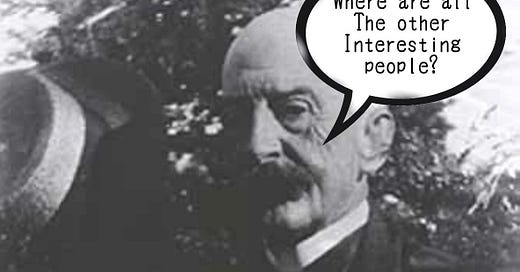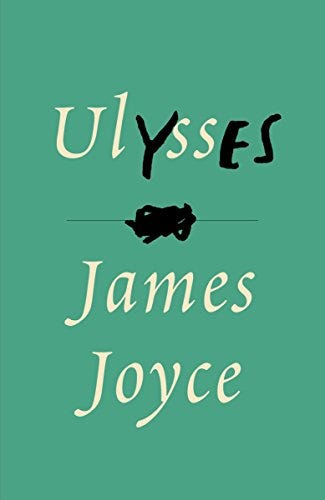Imagine you were at a party a couple years ago and someone asked you what you’re working on.
You said Everything Everywhere All At Once.
They said Fabelmans. And on the side they did some work on Empire of Light.
You’re a nobody. They’re cool.
Things change.
Daring ideas win in the end.
It’s not a great time, culturally. People are more apprehensive than ambitious. It reminds me perhaps of American art and literature in the 1860’s to 1870’s — you know, when Robert Browning was a big poet. Herman Melville had been in the 50’s. Emily Dickinson was in the 90s. The 60’s and 70’s are remembered for railroads, war, and rich people, but not really for art. Yes there were a couple standouts. Childe Hassam. Winslow Homer. But … it must have been a lonely time.
Ours has become a time of conformity and there is a resistance to anything too smart or funny (Succession and White Lotus are grandfathered in). It seems like Hollywood suddenly got some sort of head trauma and lost 30 IQ points (was it COVID?). The thing that matters now is to be sort of milquetoast-y political. Not fascinatingly, deeply, ideological or philosophical, but just straightforwardly check the box, bumper-sticker political. Which is pretty uninspiring and which gives Hollywood a Pyongyang-sur-la-mer feeling.
Nevertheless, I think we have to do the daring thing because there are exceptions and glimmers of hope and you never know what bold work might help finally turn the tide. Just like LA weather, you never know when clouds and rain might finally turn and become sunshine and warmth again. Everything eventually ends.
Also because whenever people are highly suppressed, unless they are literally constrained in a militaristic fashion, they will break out. They will come up with something passionate, sexy, bold, full of ideas, undeniable.
A lot of people talk themselves out of interesting, ambitious projects and into conventional ideas that “might sell.”
My point today is that I want to argue for the opposite choice.
Here’s the premise for Swiss Army Man, the Daniel’s film before Everything Everywhere:
A hopeless man stranded on a deserted island befriends a flatulent dead body, and together they go on a surreal journey to get home.
Which makes it sound much more normal and commercial than it is. I mean, let’s imagine you’re at Shake Shack. You’re there with a friend. She brought some guy she met last week whom she likes. He says he wants to be a filmmaker and he pitches you that premise. You tell her to stay with him or you think he’s ngmi?
My Left Foot
Ulysses
The Artist
Easy Rider
The Seventh Seal
Being There
Napoleon Dynamite
Confederacy of Dunces
All horrible ideas.
Even Ghostbusters faced fervent opposition — it was the most expensive comedy of all time.
Be Dylan, not Donovan
If you were Charlie Kaufman’s agent and he came in and told you the premise for something he was thinking about called Being John Malkovich … I mean … I can imagine most people saying “Charlie, are you ok? Is this a cry for help?”
It should never worry you if people don’t get your idea or think it’s odd.
If you think your idea is controversial, you’re probably overstating that. How controversial is it really going to be in two years? Don’t flatter yourself. No one’s head is going to explode. Everyone thought Transparent and Man in the High Castle would be controversial. It was fine.
If you tell everyone your idea and everyone thinks it is a good idea, maybe that is what should be worrying. It means that — unless you have an ultra sophisticated group of friends — it is easily digestible already today. So you’re not ahead of the curve at all. Maybe it’s the banana pancakes of movies. Yes, people like banana pancakes, but there are a lot of them and they are all the same. Basically.
If you look back a few years, you can see much that you now think was lame and routine. And yet new things today have a certain sheen by virtue of being new, because they are being written about, because they are taking up shelf space now. Don’t let that fool you or influence you. Your first instinct is correct. It’s lame and will be regarded as such soon enough.
The history of great things is the history of things most people would have given up on because they were too hard, too ambitious or too unusual and chancy. Whether it’s inventing electricity or writing Network or shooting Apocalypse Now.
What about things that are just great ideas? Like Parent Trap? I have no problem with that. What I’m saying is that, in weighing alternative options, talented people often overly discount ideas that are unconventional or ambitious. It’s common for people to say “I have three ideas. This one is solid, this other one is solid, this third one could be legendary but I am saving it for another day. It’s my art piece.” I’m just saying, don’t save it for another day. You’re not going to live forever.
I think of quality on a spectrum that is somewhat discontinuous. Over on one side you have projects that are bad or disappointing. Thirty degrees Fahrenheit. Then you get over to projects that are ok and then goodish. Seventy five degrees. But then finally there is a totally discontinuous jump where the muses sing and we make a leap to great or legendary — the kind of 10,000 degree cultural gas metal arc welder that changes the world.
When you start a project, you can’t know for sure if it’s going to achieve its aspirations and be great. But what you do know is whether it could be great.
Go for the one that can be great. We are here for the gas metal arc welders. Everything else will be forgotten.
SECRETS
I wrote a few posts ago about things that help movies get made. I was talking with a writer friend yesterday and I realize I left out one thing. Movies are all fundamentally about secrets. Each movie progresses toward revealing its secrets. Eventually we come to understand what Rosebud is. I think this is perhaps a critical addition to the discussion the other day.
All stories are about gradually revealing or discovering secrets about characters, and answering dramatic questions. Sometimes people don’t know their own secrets. Secrets about characters and dramatic questions are not the same but they are usually closely related because the dramatic question (will x happen? will this character do x?) often depends on the discovery or revelation of a secret; a secret can be about one’s self, about someone else or about the world.
Why can’t we talk about how we met? (Secret)
Will they stay together? (Dramatic question)
Why don’t we ever talk about what Francois represents? (Direct pull from Claire Denis’ last film — Secret)
Will they stay together? (Dramatic question)
What is her destiny? (Dramatic question)
What keeps her with her husband? (Secret)
Philadelphia Story — Can she get over her haughty pride to see that he’s a perfect match for her? (Dramatic Question)
Death Vader is Luke Skywalker’s father?? (Secret)
Your story is ultimately about the interaction of secrets and dramatic questions. If you don’t know what the secrets are, maybe you don’t know the story well enough yet.
AND FINALLY, SCENES THAT HAVE NO POINT
In “In the Mood For Love,” there is a scene where Tony Leung stands and looks out a window for a while.
Then there is a scene where Maggie Cheung is in her apartment and is looking out her window and thinking.
In Lost in Translation there is a scene where Scarlett looks out the window of her hotel room for a while.
In Transparent, there is a scene where Gabby Hoffman is in the back seat of a car on Sunset Boulevard with her head outside of the car just looking at the vista and panoply passing by.
Classically, one is told that the protagonist should always want something. Every scene is about conflict. Generally true. The protagonist should have a goal over the course of the story. But in the course of pursuing the goal, the protagonist behaves like a human being and thinks and learns. And sometimes stares out the window. And that is how we get to know and like them.
Scenes that have no point have a point. Stop deleting them. We want to know what people are thinking.
Best wishes friends
RP










I love movies where nothing happens. In the Mood for Love is one of my all time faves. Nothing is everything.
Thanks for relaying my thoughts exactly.